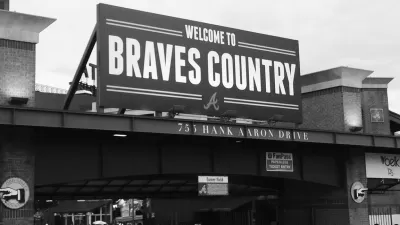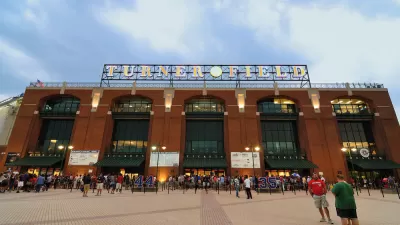Cobb County, Georgia recently approved the "Accessory Special Event Parking" ordinance to limit parking operations around the Atlanta Braves' new stadium.
In February, Cobb County commissioners "quietly passed an ordinance that outlaws property owners within a half-mile of the stadium from charging for parking during games and other special events at the stadium," according to an article by Dan Klepal.
"The ordinance closes off potential revenue for dozens of businesses that own more than 10,000 private spaces — many of which could compete with the team for parking revenue," adds Klepal.
The stadium, which will open next year with the name SunTrust Park, relies on $400 million in funding from Cobb County taxpayers, but the funding hasn't earned much transparency or broader economic development opportunities in return. In fact, writes Klepal, "[f]or thousands of fans, the restriction could mean fewer parking options on game days, making it less convenient or more expensive to go to a stadium with no direct MARTA access." What's more: "The full impact isn’t known because the Braves haven’t yet released their own parking plan."
Dave McKenna followed up on Klepal's reporting, adding an additional case study of a similar use of the lobbying power of professional sports teams to influence land use regulations: the NFL team playing in Washington, D.C. also used a public relations strategy that claims public safety necessity, rather than economic benefit, to explain the need to control parking operations.
FULL STORY: SunTrust Park parking restricted near Cobb County stadium

Alabama: Trump Terminates Settlements for Black Communities Harmed By Raw Sewage
Trump deemed the landmark civil rights agreement “illegal DEI and environmental justice policy.”

Study: Maui’s Plan to Convert Vacation Rentals to Long-Term Housing Could Cause Nearly $1 Billion Economic Loss
The plan would reduce visitor accommodation by 25% resulting in 1,900 jobs lost.

Planetizen Federal Action Tracker
A weekly monitor of how Trump’s orders and actions are impacting planners and planning in America.

Waymo Gets Permission to Map SF’s Market Street
If allowed to operate on the traffic-restricted street, Waymo’s autonomous taxis would have a leg up over ride-hailing competitors — and counter the city’s efforts to grow bike and pedestrian on the thoroughfare.

Parklet Symposium Highlights the Success of Shared Spaces
Parklets got a boost during the Covid-19 pandemic, when the concept was translated to outdoor dining programs that offered restaurants a lifeline during the shutdown.

Federal Homelessness Agency Places Entire Staff on Leave
The U.S. Interagency Council on Homelessness is the only federal agency dedicated to preventing and ending homelessness.
Urban Design for Planners 1: Software Tools
This six-course series explores essential urban design concepts using open source software and equips planners with the tools they need to participate fully in the urban design process.
Planning for Universal Design
Learn the tools for implementing Universal Design in planning regulations.
Caltrans
Smith Gee Studio
Institute for Housing and Urban Development Studies (IHS)
City of Grandview
Harvard GSD Executive Education
Toledo-Lucas County Plan Commissions
Salt Lake City
NYU Wagner Graduate School of Public Service




























